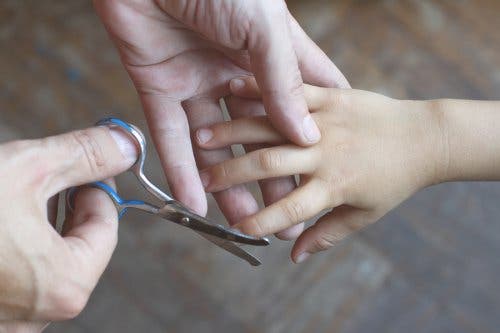Strategies To Keep Your Children from Biting Their Nails

Not biting your nails can be more complex than you might think for two reasons. First, habits, when ingrained, are often difficult to change. Second, nail-biting can be a way to express emotions.
Of course, all hope is not lost and it’s always possible to find strategies for your children to stop biting (and eating) their nails. Read on to discover them!
Tips to keep children from biting their nails

The habit of biting your nails is called onychophagia and it mainly affects children from 3 years of age onward, being more common during puberty and adolescence. In general, children normally abandon this bad habit without the need for intervention, but what can you do if it persists and becomes harmful?
In this article, we’ll give you some practical ideas, but first, we’ll find out why some kids bite their nails. There may be some kind of psychological predisposition or cause that triggers the habit.
Causes of childhood onychophagia
When we talk about onychophagy we’re not talking about a specific act, but a constant situation repeated over time – that is, the child bites their nails regularly. It’s obsessive behavior that the child often does without being aware of it.
According to data published in the Journal of Latin American Pediatric Dentistry, “the highest incidence of this bad habit occurs in puberty (44%). It is more common in males than in females. In children from 7 to 10 years old, it occurs in 28 to 33% of cases.”
Among the main causes of this problem are:
- Stress
- Anxiety
- Boredom
- Emotionally destabilizing situations for the child, such as the death of a loved one, the birth of a little brother, or family problems
Imitation may be another possible cause: the child sees one of their parents (or both) bite their fingernails and repeats the habit without even realizing it. For this reason, among others, it’s very important that you also avoid biting your nails.
You might be interested in: When Childhood Stress Is Caused by Parents
Why is it bad to bite your nails?

The obvious main problem of this action is that the child or adolescent can cause great damage to their fingers and even color changes and deformities in the nails.
Also, one of the main problems is often infections caused by the sharing of bacteria from the nails to the mouth and vice versa.
Also, the child with this disorder often bites the cuticle and skin around the nails. On the other hand, these injuries can cause your child anxiety due to their hand’s bad appearance. Thus, he enters a vicious cycle from which it can be difficult to escape.
It can also cause dental problems, such as malocclusion, wearing on the front teeth, bruxism, wearing of tooth enamel, and damaged gum tissue, among other issues.
Strategies to combat this bad habit
The first step in modifying a habit is to find out what causes it. What causes your children to bite their nails? Do they bite them at specific times? Can you identify if it’s related to fear, anxiety, tension, or boredom?
Do some research and then get to work!
You can tell your children every day that they shouldn’t bite their nails and not get the expected result. For this reason, we recommend that you adopt one of the following strategies to help your children modify their behavior.
1. Explain to your children why they shouldn’t bite their nails

We know that you’re always telling them to stop biting their nails, but we suggest you go one step further. Take the time to explain the consequences of that bad habit by adapting the information to their age and level of understanding.
2. Be their “alarm”
Talk to your kids and tell them that from that moment on you’ll remind them that they have to stop the habit every time you see them biting their nails. You can even set a code word to try to turn the situation into a playful moment!
3. Buy a teether
A good option could be to give your child a teether to help release anxiety and tension. There are many on the market, even ones specifically designed to prevent nail-biting.
4. Give them a toy to keep their hands busy
Offer your child a fidget spinner, a small stress ball, or a Rubik’s cube. The idea is to keep their hands busy and avoid chewing their nails. Another idea is to encourage your child to play sports, as it can be a great way to release tension.
5. Cut their nails daily

There’s no better way to avoid temptation than by cutting it off at the source! If your children keep their nails short, it will be harder for them to bite them and get hurt.
Get into the habit of cutting their nails every day.
6. Put on a bitter polish or lemon to prevent biting their nails
This grandmothers’ solution can be quite effective. Paint your children’s nails with bitter polish, so nibbling on them will no longer be so tempting. If you don’t have bitter polish at home, you can put lemon on their nails.
Discover: Stop Biting Your Nails – Homemade Solutions for It
7. Use a prize system
Keep your children from biting their nails using a system of points and prizes. For every day that they don’t bite their nails, they earn a point and when they have an agreed amount, you can give them a prize.
This doesn’t have to be physical. In fact, it can be a trip to the movies, a bike ride, or whatever you can think of. It’s a great way to spend time with your kids while kicking this bad habit.
Changing a habit takes time. Be patient and stick with your child every step of the way. Remember that it’s essential that they feel accompanied, supported, and loved by you.
All cited sources were thoroughly reviewed by our team to ensure their quality, reliability, currency, and validity. The bibliography of this article was considered reliable and of academic or scientific accuracy.
- Ghanizadeh, A. (2011). Nail biting; etiology, consequences and management. Iranian journal of medical sciences, 36(2), 73. https://www.ncbi.nlm.nih.gov/pmc/articles/PMC3556753/
- Revista de Odontopediatría Latinoamericana. (2011). Tratamiento de la onicofagia en niños. Revisión sistemática. https://www.revistaodontopediatria.org/ediciones/2011/1/art-14/
- Torrijos Valencia, M. V., Sánchez Meraz, W., Mariel Cárdenas, J., Gutiérrez Cantú, F. J., & Mariel Murga, H. (2016). Onicofagia en adultos. https://cdigital.uv.mx/bitstream/handle/123456789/48535/102-CYL-120416.pdf?sequence=1&isAllowed=y
- Galarza Mora, L. Y. (2020). Desgaste dental en niños de 6 a 12 años con onicofagia en la escuela “Manuel Villamarin Ortiz” de Babahoyo (Bachelor’s thesis, Universidad de Guayaquil. Facultad Piloto de Odontología). http://repositorio.ug.edu.ec/handle/redug/48519
This text is provided for informational purposes only and does not replace consultation with a professional. If in doubt, consult your specialist.








